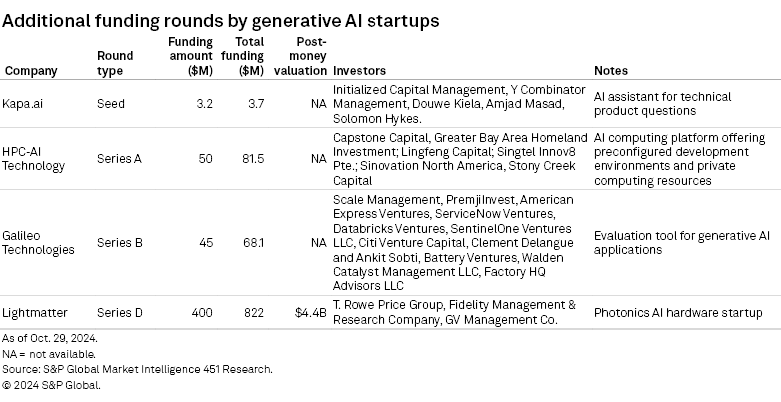Featured Topics
Featured Products
Events
S&P Global Offerings
Featured Topics
Featured Products
Events
S&P Global Offerings
Featured Topics
Featured Products
Events
S&P Global Offerings
Featured Topics
Featured Products
Events
Financial and Market intelligence
Fundamental & Alternative Datasets
Government & Defense
Professional Services
Banking & Capital Markets
Economy & Finance
Energy Transition & Sustainability
Technology & Innovation
Podcasts & Newsletters
Financial and Market intelligence
Fundamental & Alternative Datasets
Government & Defense
Professional Services
Banking & Capital Markets
Economy & Finance
Energy Transition & Sustainability
Technology & Innovation
Podcasts & Newsletters
Research — Nov 14, 2024

By Alexander Johnston
A major new funding round for OpenAI LLC brought a fast start to this month's news. Other announcements included new edge models by Mistral, a video-generation capability from Meta Platforms Inc., Anthropic PBC's Claude gaining the ability to use computers and NVIDIA Corp. open-sourcing a new 72-billion-parameter model. And California saw the Safe and Secure Innovation for Frontier Artificial Intelligence Models Act vetoed.

Generative AI, particularly the nebulous concept of artificial general intelligence, is often presented as a race. This framing is particularly instructive when looking at the recent actions of OpenAI, which added an exclusivity request as part of its mammoth $6.6 billion round announced in October. This request appears particularly notable in the context of OpenAI as the entity had in its charter the suggestion that, "If a value-aligned, safety-conscious project comes close to building AGI before we do, we commit to stop competing with and start assisting this project." Notably, only five companies appear to have been explicitly named in this exclusivity request, which likely reflects the wide array of specialist generative AI startups that have already fallen away in this perceived race. This was further underlined by announcements over the past few weeks by Character.ai, which is following in the footsteps of Aleph Alpha and Inflection AI Inc. as well-capitalized startups (initially building their own models) that were no longer able to compete in developing foundation models and had to pivot their offerings. Specialist startups are further challenged by the rapid improvement of open-source models, with NVIDIA and Ai2 contributing to the burgeoning ecosystem this month.

Product releases and updates
Character.ai CEO Dominic Perella announced the business would be pivoting away from model development to focus on its application offering — chatbots. What makes this interesting is the parallels some reports have made with fellow generative AI startup Inflection's transition, which we reported in March. Character.ai has seen its founders, and some members of its research team, move to Google LLC's AI unit, DeepMind, following a $2.7 billion licensing deal. Google suggests that, unlike Microsoft Corp.'s engagement with Inflection, only a small proportion of Character.ai's staff are moving to Google, and refutes the comparison. Regardless, like Inflection, Character.ai appears no longer able to primarily compete as a general-purpose large language model (LLM) developer.
Meta showcased its text-to-video generator, Movie Gen. Currently a research project rather than a publicly available offering, Meta released videos showing high-quality HD generations that can meet multiple aspect ratio requirements, with synchronized audio. Users would have the opportunity to produce new videos and edit existing ones. The research paper outlines the opportunity to apply the user's image to deliver a more closely tailored video. There appears to be an objective to eventually release the capability — although the cost and lengthy processing times were explicitly cited as challenges by Chris Cox, Meta's chief product officer.
OpenAI announced ChatGPT Canvas, a new interface where users can establish projects. These projects can be text or code, and are designed for multi-stage iteration. A user can identify a section they want reworked or issue tasks such as changing a style, checking grammar or shortening a paragraph. The comparison most commonly made has been with Anthropic's Artifacts feature, but there is also an interesting parallel with the features of Microsoft Copilot and the features Google is rolling out within Google Docs.
Claude 3.5 Sonnet and Claude 3.5 Haiku have been launched by Anthropic, claiming significant improvements in coding and performance. A new public beta feature, computer use, enables Claude to interact with computers like humans. Claude can now handle software setup, execute user commands to navigate a computer screen, click on specific areas and enter data using a virtual keyboard, for example.
Adobe Max saw the showcasing of a range of video-generation capabilities, with extension and generation tools unveiled within Firefly and Premier Pro. In limited public beta, the video generator is presented as being the first commercially safe option on the market. Other announcements centered on enhancements to vector- and image-generation capabilities, and a shared generative AI workspace in Photoshop.
NVIDIA announced an open-source multimodal foundation model family, NVLM 1.0. With a pledge to make both the model weights and training code available — and benchmarks suggesting that the flagship 72-billion-parameter model is comparable with leading proprietary models for many tasks — NVLM 1.0 is positioned as democratizing access to generative AI. The NVLM 1.0 models are vision-language models that can be prompted with both text and images.
The Allen Institute for AI (Ai2) also announced a multimodal family of models, titled Molmo. Molmo is available as a 72-billion-parameter model, or at 7 billion or 1 billion parameters. The narrative behind the release is that Molmo uses high-quality data, which allows it to outperform larger models, and the release specifically outlines the use of pointing data. This involved annotators identifying individual objects in images and writing descriptions. Ai2 sees this pointing capability as particularly useful in a robotics context.
Lenovo Tech World in Seattle saw a number of notable AI announcements. These included Lenovo Hybrid AI Advantage with NVIDIA, which is presented as an AI use-case accelerator, as well as a new "AI laptop," a local AI agent and a liquid cooling innovation to help improve the sustainability of AI.
Mistral announced two new edge models, "les Ministraux" — Ministral 3B and Ministral 8B. These models support context windows of up to 128,000 tokens, with the 8-billion-parameter model developed with an attention pattern that speeds up inference and makes the process less memory-intensive.
International Business Machines Corp. announced new 8 billion and 2 billion-parameter base and instruct models as part of its Granite 3.0 series. The company indicates the development of the models benefitted from new research from IBM Research surrounding learning rates for pre-trained LLMs. A set of detection "guardrail" model variants were also released, at 8 billion and 2 billion parameters, designed to help detect offensive or malicious content.
Funding and M&A
OpenAI closed its $6.6 billion round on Oct. 2, with the transaction raised at a post-money valuation of $157 billion. This is the largest VC round of all time. Investors included Thrive Capital Management, Microsoft, Khosla Ventures, Tiger Global Management, NVIDIA, Altimeter Capital Management, Fidelity Management & Research Co. LLC, MGX and SoftBank Group Corp. The size of the round was not the only reason it drew headlines, with much discussion surrounding OpenAI's exclusivity demand that reportedly asked investors not to back rival AI startups. The companies named in the stipulation are Perplexity AI Inc., Glean Technologies Inc., Anthropic, Safe Superintelligence and Musk's xAI.
Perplexity AI is reportedly in funding talks, with the intent to raise roughly $500 million, at an $8 billion valuation. The conversational search tool provider's prior round, announced in June 2024, was a $272 million series C. Little is known about this current wave of talks, but the corporate venture capital arm of Telefónica SA has invested in the startup. Few explicit details were announced, although Telefónica appears to have signed a global commercial agreement to jointly offer services to customers in Brazil, the UK and Spain.
Codium Ltd., which does business as Qodo, announced a $40 million series A, bringing total funding to $51 million. The round was co-led by new investors Square Peg Capital and Susa Ventures Management and included participation from new investors ICON Space and Firestreak Ventures, as well as returning investors TLV Partners and Vine Ventures. Tel Aviv-headquartered Codium develops a programming tool with the ability to generate code, tests and documentation.
Customer service chatbot provider CrescendoAI Inc. announced the closing of a series of venture round financings totaling $50 million on Oct. 2. The most recent round, a series C, was led by General Catalyst, with participation from Celesta Capital and Alorica. The company's post-money valuation is $500 million. The same day the company announced the acquisition of PartnerHero North America, which offers outsourcing solutions. Few details about the transaction have been released. Other rounds of interest include:

Politics and regulations
The most notable legislative news in the US over the past few weeks may be the absence of legislation, rather than its passing. The Safe and Secure Innovation for Frontier Artificial Intelligence Models Act, an AI safety bill passed by the Californian legislature in late August, was vetoed by Gov. Gavin Newsom. The bill faced staunch opposition from several major AI companies, but Newsom's messaging was couched in terms of what the legislation did not take into account, rather than it being too restrictive. A number of more focused AI bills did pass, however, including a set targeting sexual offenses enabled by generative AI. The most controversial appears to be a bill which requires high-level summaries of training sets to be provided by 2026, including information on how the data was procured.
There are reports that the Biden administration is considering an additional set of chip export controls. Widening the countries that face controls on export licenses is seen as a way of ensuring that China is not circumventing restrictions indirectly. With the Biden administration entering into its last days, whether this desire for chip restrictions translates into policy is a point of discussion.
The UK appeared to walk back copyright legislation the Starmer administration appeared to be angling at AI companies. UK AI minister Feryal Clark made a suggestion that proposals would be presented by the end of the year but suggested that they were talking to companies about a "way forward."
France appointed an AI minister, Clara Chappaz, an illustration of its intent to take a leading role in AI within the EU. This appointment is notable in the context of the repeated comments of President Emmanuel Macron on the threat of over-regulation within the EU. At a recent startup event in Paris, he stated that, "Regulation must be controlled, not punitive."
Japan Fair Trade Commission announced a risk study into the generative AI market, collecting opinions until Nov. 22. Findings are expected to be released next spring, with semiconductor availability and companies using AI services to prioritize their own services said to be areas of focus.
.
This article was published by S&P Global Market Intelligence and not by S&P Global Ratings, which is a separately managed division of S&P Global.
451 Research is a technology research group within S&P Global Market Intelligence. For more about the group, please refer to the 451 Research overview and contact page.
Location
Products & Offerings
Segment